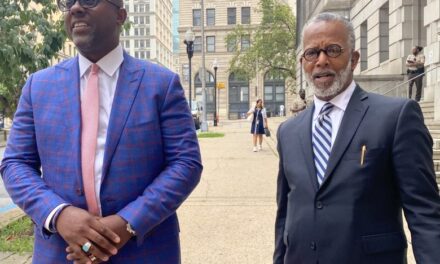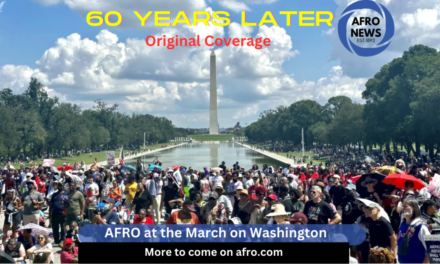By Aria Brent
AFRO Staff Writer
abrent@afro.com
In March 2020, as life came to a halt due to the COVID-19 pandemic, businesses big and small found themselves struggling to stay open. Challenged by quarantine mandates and remote work, many entrepreneurs saw their companies go under. However, while some business struggled, others thrived. Many were able to take advantage of support made available via government and private funding.

CREDIT: Photo courtesy of JC Lofton Tailors
“During COVID a lot of the money was distributed,” said Peter Opare, chef and manager of Open Crumb, a scratch kitchen serving a variety of Black foods. “I saw an increase in my sales because a lot of people in my community were receiving additional government assistance which gave them more disposable income.”
“Our community– like any community– loves food and loves supporting people. I saw more customers come to us,” he added.
Located in D.C.’s historic Anacostia area, Open Crumb’s story of increased sales amidst the pandemic is a bit of an anomaly. Opare’s meals caught the attention of residents across the city. In turn, he was afforded opportunities he never expected– but definitely needed to propel his business to the next level.
Although Opare was able to thrive amidst the pandemic, other businesses fought to create revenue and keep their doors open. Long time business owner Julius Lofton Jr., of JC Lofton Tailors, had trouble with consistent clientele throughout the pandemic, due to the increased amount of remote jobs. He spoke to the AFRO on how the pandemic is still affecting his tailoring business today.
“When the pandemic came and people were working from home, it affected us because people weren’t really wearing suits. It’s still affecting us because people are working from home and don’t wear business attire,” said Lofton. “I knew we had to pivot and we started making masks. It was something to keep money flowing into the shop. However, no one was prepared for everything to just stop the way it did. When LISC came in and talked to me about some additional funding, it really helped.”
Local Initiative Support Corporation (LISC) is a nonprofit organization focused on forging resilient and inclusive communities of opportunity across the nation.The local chapter of the 501c3 helped bridge the financial gap created during COVID by connecting small, local businesses with Wells Fargo.
“We were thrilled to partner with Wells Fargo to ultimately inject money into small businesses that are critical to the local communities fabric, particularly East of the river,” said Ashley Rosado, assistant program officer for LISC D.C. “We were able to do that in collaboration with the Anacostia Business Improvement District who helped us identify and connect with local businesses who needed the money the most.”
The Wells Fargo Open for Business Fund has played a key role in broadening the economic stimulation of small businesses. The program has not only helped businesses survive, but also create jobs and expand. Darlene Goins, Wells Fargo head of philanthropy and community impact, discussed the importance of preserving and creating jobs at small businesses.
“Wells Fargo wanted to create a large-scale, inclusive small business recovery effort that focused on helping businesses stay open and preserve and create jobs,” she said. “We took the gross processing fees that we earned from administering the Paycheck Protection Program for the government in 2020 and we put that back into the small business community to the tune of roughly $420 million and we created the Open for Business Fund.”
Lofton noted that the funding from Wells Fargo allowed him to keep paying his employees in spite of the company’s lack of constant business. It was also explained that the support of long-time customers and the community at large helped keep the doors of the historic tailor shop open .
“We’ve been in business so long that we have a lot of long-time clients and I had a couple of clients that offered me loans because they didn’t want to see us shut down. People brought us stuff to make sure we survived,” Lofton said.
Opare was also a recipient of the funding provided by Wells Fargo, noting that it helped him revamp his marketing and buy new equipment for his business.
“We upgraded a lot of our equipment that we needed and we changed our marketing. While our neighbors having access to more capital to spend with us was beneficial, we also saw the need to better market ourselves to people outside of our community,” Opare said.
While many businesses nationwide did not receive pandemic funds to stay afloat, National Black Business Month is the perfect time to patronize small Black businesses and stimulate the Black economy.
“Black businesses tell a story and connect with the community on a different level than large corporations. Small Black businesses are more likely to hire within our community and give opportunities to people that have not had the same opportunities as us,” said Opare. “By supporting Black businesses you’re saying ‘I not only support you as a business, but I support my community because I know that you are within my community.’”
The post Small businesses owners in D.C. speak on impact of COVID-19 pandemic appeared first on AFRO American Newspapers.











